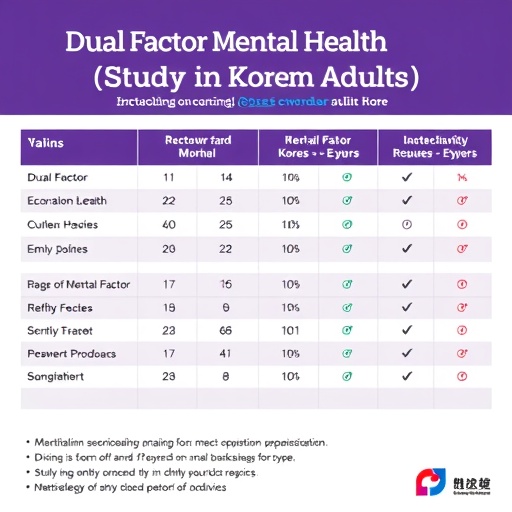In the rapidly evolving field of mental health research, a groundbreaking study emerging from South Korea has introduced a novel dual-factor perspective that profoundly reshapes our understanding of well-being among adults. This pioneering investigation employed advanced latent profile analysis techniques to dissect the multifaceted nature of mental health, moving beyond traditional unidimensional assessments. This paradigm-shifting approach segregates mental health across two intertwined dimensions—positive well-being and psychopathological symptoms—offering a refined lens through which to examine the complex human psyche.
Mental health has often been simplistically viewed as the mere absence of mental illness, but this recent study underlines the critical importance of evaluating positive mental health attributes independently from psychological distress. Leveraging a nationally representative sample of Korean adults, the research identifies distinct mental health profiles, illuminating how individuals’ experiences of well-being and distress coexist in dynamic patterns. This insight challenges prevailing public health frameworks and advocates for nuanced, dual-factor interventions tailored to the unique mental health landscape individuals navigate.
At the heart of the study is the application of latent profile analysis (LPA), a sophisticated statistical method that uncovers unobserved subgroups within a population based on observed psychological indicators. Unlike traditional clustering methods, LPA provides probabilistic classification, improving the precision of mental health typologies. The dual-factor model operationalized in this research considers both the presence of positive mental health indicators—such as life satisfaction, emotional vitality, and social functioning—and the levels of psychopathological symptoms, including depression, anxiety, and stress.
The intricate analysis unveiled several discrete profiles among Korean adults, transcending the simplistic binary of mentally ill versus mentally well. For example, some individuals exhibited high positive well-being even in the presence of subclinical psychological distress, a group potentially resilient or experiencing thriving mental health despite adversity. Conversely, others manifested low subjective well-being accompanied by moderate symptomatology, highlighting the clinical complexity that demands differentiated clinical and community health responses.
Importantly, this dual-factor perspective recalibrates how mental health services should target interventions. Rather than solely focusing on symptom alleviation, mental health promotion must equally nurture psychological flourishing. This holistic approach has profound implications for policy-makers, clinicians, and mental health advocates aiming to enhance quality of life across populations. The study’s detailed mental health profiles enable tailored mental health strategies—some emphasizing symptom mitigation, others fostering personal strengths and social connections.
The methodology involved rigorous validation checks ensuring the reliability and internal consistency of latent profiles detected within the adult population. The dataset included standardized scoring on psychometric scales measuring both positive and negative mental health dimensions. The nuanced modeling accounted for demographic factors such as age, gender, socio-economic status, and urban versus rural residency, which subtly modulate mental health manifestations and risk.
A compelling outcome of the study is its reinforcement of the notion that mental health is a spectrum rather than a dichotomy. The latent profiles shed light on transitional states, where individuals might oscillate between flourishing and languishing phases depending on environmental stressors, life events, and personal coping resources. The temporal stability of these profiles remains a vital area for future longitudinal research, promising to deepen intervention timing and effectiveness.
Furthermore, the cross-cultural context of this research adds a valuable dimension to global mental health discourse. Korea, with its unique socio-cultural matrix and rapidly modernizing society, provides an illuminating backdrop for examining how traditional values intersect with emerging mental health trends. This contextual lens is essential for interpreting the dual-factor model, as cultural factors influence both the expression and interpretation of mental health indicators.
The implications for clinical practice are profound. Mental health practitioners are encouraged to integrate assessments that capture positive psychological assets alongside psychopathology symptoms. This integrated diagnostic approach facilitates a more comprehensive patient profile, enabling clinicians to craft personalized therapeutic pathways. Interventions that cultivate optimism, resilience, and social connectedness can be as critical as pharmacological or psychotherapeutic treatments targeting symptoms.
Additionally, public health campaigns can leverage these insights to destigmatize mental health challenges by emphasizing that mental health encompasses well-being and that mental illness does not preclude the possibility of a fulfilling life. This destigmatization is crucial in societies where mental health discussions remain taboo, creating barriers to seeking help.
From a policy perspective, the study advocates for resource allocation that supports community-based mental health promotion activities alongside conventional clinical services. Programs fostering social engagement, mindfulness, and healthy lifestyle habits can fortify positive mental health and serve as prophylactic measures against psychological distress.
The intersection of mental health and socio-economic stressors was also elaborated upon. The analysis indicated that precarious employment, low income, and social isolation correlate with profiles characterized by low positive well-being and elevated psychological symptoms. Thus, social determinants of mental health must be integrated into comprehensive mental health frameworks, emphasizing intersectoral collaboration to address these underlying factors.
Future research directions proposed include longitudinal tracking of these latent profiles to ascertain causality and temporal dynamics, as well as expanding the dual-factor approach to diverse populations to test cross-national validity and adaptability. Incorporating biological and neurophysiological markers alongside psychometric evaluations could also enrich the understanding of the biopsychosocial mechanisms underpinning mental health profiles.
This pioneering study stands as a crucial milestone in reframing mental health discourse. It underscores the essential shift from pathology-focused paradigms to holistic models recognizing the coexistence of distress and flourishing. By adopting this dual-factor approach, mental health research, policy, and practice can advance towards more effective, person-centered strategies that honor the complexity of human experience.
In conclusion, this novel dual-factor model and latent profile analysis provide a transformative framework for comprehensively understanding mental health in general adult populations. The insights drawn from South Korea’s demographic offer a replicable template for other nations seeking to unravel the nuanced interplay of positive mental health and psychopathology. Ultimately, this work paves the way for innovations that foster resilience, elevate well-being, and mitigate mental health burdens on a global scale.
Subject of Research:
Article Title:
Article References:
Choi, J.Y. A Dual-Factor Approach to Mental Health Among General Adults in Korea: A Latent Profile Analysis.
Int J Ment Health Addiction (2025). https://doi.org/10.1007/s11469-025-01564-5
Image Credits: AI Generated




